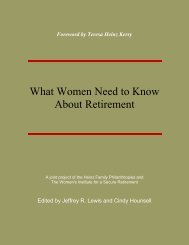What Women Need to Know About Retirement - Wiser
What Women Need to Know About Retirement - Wiser
What Women Need to Know About Retirement - Wiser
Create successful ePaper yourself
Turn your PDF publications into a flip-book with our unique Google optimized e-Paper software.
For millions of women who rely heavily on Social Security income, the monthly benefit amount<br />
can mean the difference between making ends meet and sliding in<strong>to</strong> poverty. Your own personal<br />
situation should guide you in your decision on when <strong>to</strong> begin receiving benefits. Ask yourself<br />
these questions:<br />
� Can you count on a pension, income from retirement savings, or other income during<br />
retirement?<br />
� Are you healthy enough <strong>to</strong> continue working?<br />
� Is the difference between the benefit amounts at different ages significant given your<br />
situation?<br />
For most people in good health, it’s better <strong>to</strong> wait at least until full retirement age. If you’re like<br />
Jennifer, you might want <strong>to</strong> consider delaying your Social Security benefits for a year or more<br />
after you reach full retirement age. Jennifer’s benefit will go up by more than $900 a month if<br />
she holds off retiring until age 70.<br />
If you decide <strong>to</strong> delay your Social Security benefit, you still have <strong>to</strong> sign up for Medicare health<br />
insurance three months before you turn 65. Call (800) 772-1213 <strong>to</strong> set up a phone appointment<br />
or <strong>to</strong> request an in-person meeting at your local Social Security office.<br />
How Work Affects Your Benefits<br />
If you plan on receiving your Social Security benefits beginning at age 62 and think you may<br />
continue <strong>to</strong> work while receiving them, your earnings could reduce your benefits. If you earn<br />
above a set limit, you lose one dollar in Social Security benefits for every two dollars over the<br />
limit. The limit changes with the cost of living, but in 2007 it is $12,960. Let’s look at an<br />
example of how this plays out:<br />
Lynn turned 62 in January and signed up for Social Security early retirement benefits. She<br />
began receiving $800 a month. However, Lynn kept on working, and her <strong>to</strong>tal income from her<br />
job will be $20,480 this year. This puts Lynn over the $12,960 earnings limit by $7,500. She<br />
loses one dollar for every two dollars over the limit, so in her case Lynn will lose $3,750 in<br />
benefits this year. This drops her monthly benefit down <strong>to</strong> $490 from $800.<br />
In the year you reach full retirement age, your benefit will be cut by one dollar for every three<br />
dollars over the earnings limit. But in the years after that, your benefit is no longer reduced due<br />
<strong>to</strong> earnings.<br />
If you start collecting benefits and continue <strong>to</strong> work beyond full retirement age, your benefit may<br />
be higher in the future. Additionally, if your latest years of earnings turn out <strong>to</strong> be among your<br />
highest, your benefits will be adjusted upward <strong>to</strong> reflect those higher earning years.<br />
#4: How <strong>to</strong> Find Out <strong>What</strong> Your Benefits Will Be<br />
Each year, the Social Security Administration sends out benefit estimate statements <strong>to</strong> workers<br />
age 25 or older. You should get it about three months before your birthday. The statement tells<br />
you what benefits you can expect <strong>to</strong> receive at retirement. It also contains your earnings record,<br />
35




